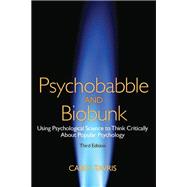
Note: Supplemental materials are not guaranteed with Rental or Used book purchases.
Purchase Benefits
Looking to rent a book? Rent Psychobabble and Biobunk Using Psychological Science to Think Critically About Popular Psychology [ISBN: 9780205015917] for the semester, quarter, and short term or search our site for other textbooks by Tavris, Carol. Renting a textbook can save you up to 90% from the cost of buying.
Carol Tavris earned her Ph.D. in the interdisciplinary program in social psychology at the University of Michigan, and as a writer and lecturer she has sought to educate the public about the importance of critical and scientific thinking in psychology. In addition to this text, she and Carole Wade have written Psychology; Psychology in Perspective; and The Longest War: Sex Differences in Perspective. Dr. Tavris is also coauthor, with Elliot Aronson, of Mistakes Were Made (But Not by Me): Why We Justify Foolish Beliefs, Bad Decisions, and Hurtful Acts; and author of The Mismeasure of Woman and Anger: The Misunderstood Emotion. She has written on psychological topics for a wide variety of magazines, journals, edited books, and newspapers, some of which have been collected in Psychobabble and Biobunk: Using psychological science to think critically about popular psychology. Dr. Tavris lectures widely on topics involving science vs. pseudoscience in psychology and psychiatry, on writing about science for the public, and many other subjects of contemporary interest. She has taught in the psychology department at UCLA and at the Human Relations Center of the New School for Social Research in New York. She is a Fellow of the American Psychological Association and a charter Fellow of the Association for Psychological Science; a member of the editorial board of the APS journal Psychological Science in the Public Interest; and a member of the international advisory board of the Institute for Science and Human Values.
| A Note to the Reader | p. vii |
| About the Author | p. x |
| Thinking Critically-And Why We Often Don't | |
| "Why Won't They Admit They're Wrong?" and Other Skeptics' Mysteries | p. 3 |
| Personality, Motivation, and Development | |
| Outliers: The story of success | p. 9 |
| Men to Boys: The making of Modern immaturity | p. 13 |
| Understanding Attachment: Parenting, child care, and emotional development | p. 17 |
| Love at Goon Park: Harry Harlow and the science of affection | p. 22 |
| Happiness: Lessons from a new science | p. 26 |
| Making Happy People: The nature of happiness and its origins in childhood | |
| Going Sane | p. 26 |
| Bright-Sided: How the Relentless Promotion of positive thinking has undermined America | p. 31 |
| The Nurture Assumption: Why children turn out the way they do | p. 35 |
| Personality: What makes you the way you are | p. 40 |
| "Are Girls As Mean As They Say They Are?" (review essay) | p. 44 |
| Psychotherapy and the Scientist-Practitioner Gap | |
| The Body Never Lies: The lingering effects of hurtful parenting | p. 55 |
| Into the Minds of Madmen: How the FBI's behavioral science unit revolutionized crime investigation | p. 58 |
| Remembering Trauma | |
| Out of the Dark | p. 63 |
| In Therapy We Trust: America's obsession with self-fulfillment | p. 68 |
| Prisoners of Hate: The cognitive basis of anger, hostility, and violence | p. 71 |
| Making Us Crazy: DSM: The psychiatric bible and the creation of mental disorders | p. 75 |
| Of Two Minds: The growing disorder in American psychiatry | p. 79 |
| Research Methods and Social Issues | |
| The Hungry Gene: The science of fat and the future of thin | p. 87 |
| The Genius Factory: Unravelling the mysteries of the Nobel Prize sperm bank | p. 90 |
| Rape: A history from 1860 to the present | p. 94 |
| Sex and the Psyche | p. 99 |
| Table of Contents provided by Ingram. All Rights Reserved. |
The New copy of this book will include any supplemental materials advertised. Please check the title of the book to determine if it should include any access cards, study guides, lab manuals, CDs, etc.
The Used, Rental and eBook copies of this book are not guaranteed to include any supplemental materials. Typically, only the book itself is included. This is true even if the title states it includes any access cards, study guides, lab manuals, CDs, etc.